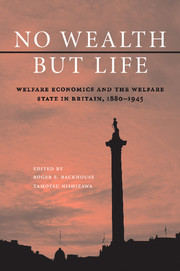Crossref Citations
This Book has been
cited by the following publications. This list is generated based on data provided by Crossref.
BACKHOUSE, ROGER E.
2009.
ROBBINS AND WELFARE ECONOMICS: A REAPPRAISAL.
Journal of the History of Economic Thought,
Vol. 31,
Issue. 4,
p.
474.
BACKHOUSE, ROGER E.
and
MEDEMA, STEVEN G.
2009.
ROBBINS'SESSAYAND THE AXIOMATIZATION OF ECONOMICS.
Journal of the History of Economic Thought,
Vol. 31,
Issue. 4,
p.
485.
Backhouse, Roger E.
2010.
Methodology in action.
Journal of Economic Methodology,
Vol. 17,
Issue. 1,
p.
3.
Caldari, Katia
and
Masini, Fabio
2011.
Pigouvian versus Marshallian tax: market failure, public intervention and the problem of externalities.
The European Journal of the History of Economic Thought,
Vol. 18,
Issue. 5,
p.
715.
McLure, Michael
2012.
A.C. Pigou’sWealth and Welfare.
History of Economics Review,
Vol. 56,
Issue. 1,
p.
101.
McLure, Michael
2013.
Assessments of A. C. Pigou’s Fellowship Theses.
History of Political Economy,
Vol. 45,
Issue. 2,
p.
255.
Katselidis, Ioannis A.
2014.
From Beveridge to "Flexicurity": Old and Recent Labour Policies.
HISTORY OF ECONOMIC THOUGHT AND POLICY,
p.
97.
Takami, Norikazu
2014.
The Sanguine Science: The Historical Contexts of A. C. Pigou’s Welfare Economics.
History of Political Economy,
Vol. 46,
Issue. 3,
p.
357.
Donnini Macciò, Daniela
2015.
G.E. Moore's philosophy and Cambridge economics: Ralph Hawtrey on ethics and methodology.
The European Journal of the History of Economic Thought,
Vol. 22,
Issue. 2,
p.
163.
Knight, Karen
2016.
A.C. Pigou, a Loyal Marshallian?.
History of Economics Review,
Vol. 64,
Issue. 1,
p.
42.
Arthmar, Rogério
and
McLure, Michael
2017.
The Palgrave Companion to Cambridge Economics.
p.
51.
Lovejoy Knight, Karen
2018.
A.C. Pigou and the 'Marshallian' Thought Style.
p.
151.
Furner, Mary O.
2018.
DEFINING THE PUBLIC GOOD IN THE U.S. GILDED AGE, 1883–1898: “FREEDOM OF CONTRACT” VERSUS “INTERNAL POLICE” IN THE TORTURED HISTORY OF EMPLOYMENT LAW AND REGULATION.
The Journal of the Gilded Age and Progressive Era,
Vol. 17,
Issue. 2,
p.
241.
Desmarais-Tremblay, Maxime
2019.
The Normative Problem of Merit Goods in Perspective.
Forum for Social Economics,
Vol. 48,
Issue. 3,
p.
219.
Backhouse, Roger E.
Baujard, Antoinette
and
Nishizawa, Tamotsu
2021.
Welfare Theory, Public Action, and Ethical Values.
p.
1.
Cain, Peter
2021.
Welfare Theory, Public Action, and Ethical Values.
p.
58.
Yamazaki, Satoshi
2021.
Welfare Theory, Public Action, and Ethical Values.
p.
97.
Binder, Constanze
2021.
Welfare Theory, Public Action, and Ethical Values.
p.
277.
Nishizawa, Tamotsu
2021.
Welfare Theory, Public Action, and Ethical Values.
p.
77.
Desmarais-Tremblay, Maxime
and
Stojanović, Aleksandar
2022.
Framing Institutional Choice, 1937–1973: New Institutional Economics and the Neglect of the Commons.
Review of Political Economy,
Vol. 34,
Issue. 4,
p.
665.





